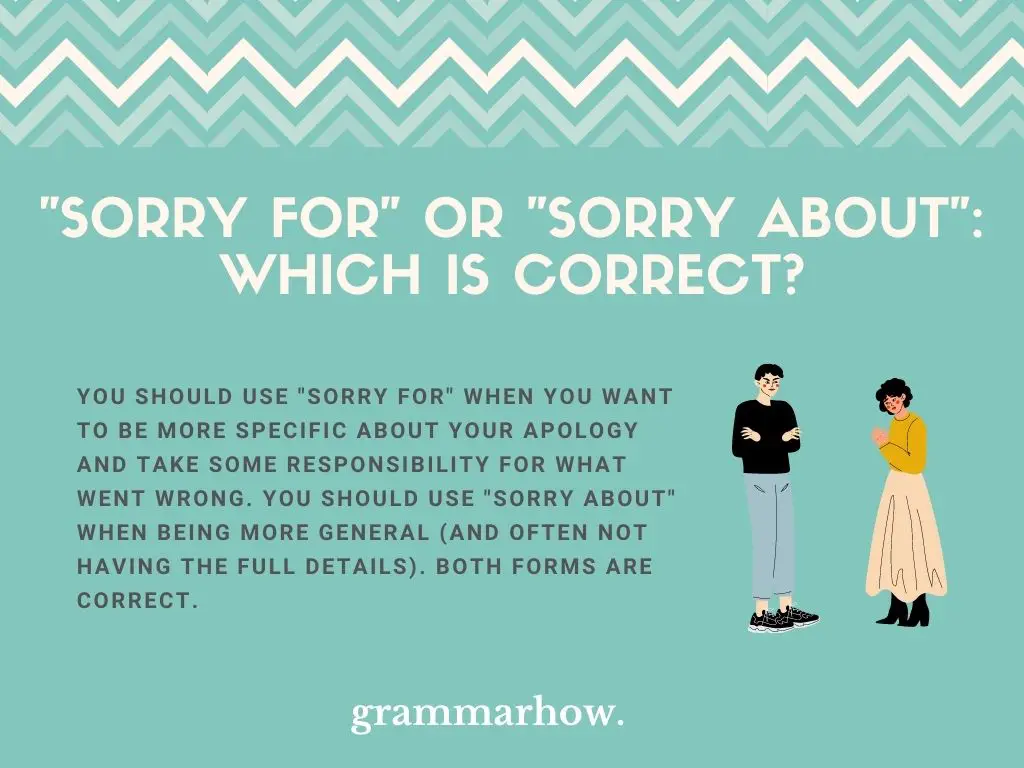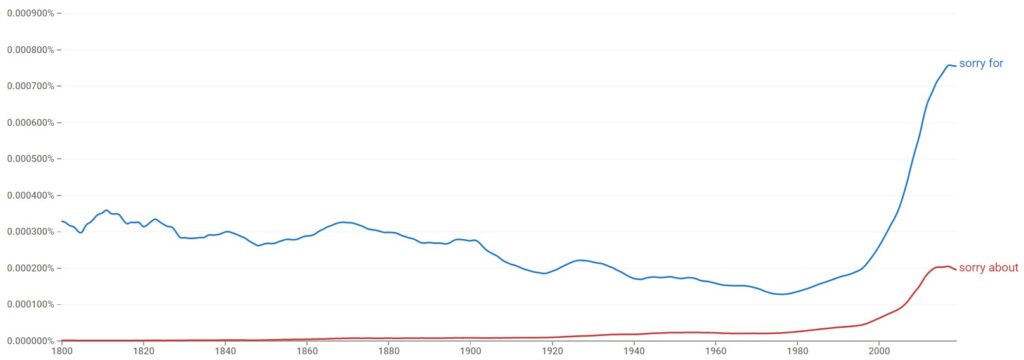We use “sorry” when we want to apologize for something. Whether it’s something we feel responsible for or not is defined by prepositions, and we can use different prepositions after it to change the meaning. This article will look at “sorry for” and “sorry about” and how to use them.
“Sorry For” Or “Sorry About”: Which Is Correct?
You should use “sorry for” when you want to be more specific about your apology and take some responsibility for what went wrong. You should use “sorry about” when being more general (and often not having the full details). Both forms are correct.

The definition of “sorry,” according to The Cambridge Dictionary, is “feeling sadness, sympathy, or disappointment, especially because something unpleasant has happened or been done.”
We can use the prepositions “for” and “about” to express this sadness or sympathy with the person we’re speaking to. Of course, “for” shows that we’re more responsible, while “about” is more general and often doesn’t have much to do with us.
You may also like: Sorry For Bothering You vs. Sorry To Bother You (Meaning & Alternatives)
Is “Sorry For” Or “Sorry About” Used The Most?
We think it’s important to check which one gets used more. That way, you can see what’s more likely to come up in situations where you’re talking to native speakers. More popular words are better to learn since more people are going to use them.
According to Google, “sorry for” is mentioned 125,000 times on The New York Times website, while “sorry about” is mentioned 3,220 times.
We can also go further and look at the following graph. These numbers coincide with the information we found on The New York Times website. It shows that “sorry for” is by far the most popular choice (it’s also been growing exponentially compared to “sorry about”).

But what is it that makes “sorry for” so much more popular? It’s all about responsibility.
When we apologize and use “sorry,” we often want to make the person we’re talking to feel better. That means we’re trying to accept our responsibility for potential damage we’ve caused, which is why “sorry for” is always more appropriate to use.
It’s more common to come by situations where we need to apologize for the way we acted or the things we did. However, there are situations where “sorry about” is more appropriate, and we don’t need to blame ourselves for it.
Can “Sorry For” And “Sorry About” Ever Be Used Interchangeably?
We can sometimes use the phrases interchangeably, though you can’t always do so. It depends mostly on the context.
“Sorry for” and “sorry about” aren’t always interchangeable. You can use “sorry for” in place of “sorry about” more often than not, but you can’t use “sorry about” in place of “sorry for.”
To help you understand this, we’ll include some examples:
- I’m sorry about your loss.
- I’m sorry for your loss.
This is perhaps one of the most common instances where “sorry about” and “for” are interchangeable. In both cases, someone has lost somebody dear to them. We might not know the person well, and we certainly didn’t have anything to do with their passing, which is why “about” works in the general sense.
However, in this example, “for” also works to be general about the loss. It works because we’re simply apologizing sincerely to them. It’s almost seen as a way to wish them in the future and to say “sorry” for what they’re currently going through.
On the other side, though:
- I’m sorry for what I did to you.
- I’m sorry about what I did to you.
These examples aren’t interchangeable. “Sorry for” is great when you want to accept responsibility, which is what we’re trying to achieve in this sentence. Using “sorry about” takes away from the gravity of the apology and seems insincere.
Examples Of How To Use “Sorry For” In A Sentence
We’ll cover some more examples to help you understand how they work. “Sorry for” is the most common choice of the two, so you’ll likely come across this a lot more often than anything else.
- I’m sorry for the things I said to you.
- We’re sorry for not helping when you needed us.
- They’re sorry for not being there!
- She’s sorry for everything she did.
- He’s sorry for not being kind.
- I’m sorry for what I did.
- You’re sorry for being mean.
“Sorry for” accepts responsibility. We mainly use it to share a genuine apology with somebody and tell them that you feel bad about whatever it is you’re apologizing for.
Examples Of How To Use “Sorry About” In A Sentence
“Sorry about” is the more general of the two. Let’s go over some examples of how it works well in a sentence.
- I’m sorry about yesterday; I don’t know what happened.
- We’re sorry about what you went through.
- He’s sorry about the things that happened.
- I’m sorry about not being available after the shambles at work yesterday.
- I’m sorry about what I heard!
- He’s sorry about your loss.
- They’re sorry about the mess that was caused.
“Sorry about” is more general and is mostly used when no one is taking responsibility. Generally, we use it when we’re an outsider to the situation that we’re apologizing for.
Which Other Prepositions Can Be Used After “Sorry”?
“For” and “about” aren’t the only prepositions available to use after “sorry.” There is one other preposition we can share with you that works well after sorry.
Sorry That
“Sorry that” works best when we want to apologize for an event that happened. It works whether we want to take responsibility or not.
- I’m sorry that happened to you!
- I’m sorry that I did that.
We can use “sorry that” in place of “sorry for” if we take responsibility or “sorry about” if we don’t.
Is It Ever Correct To Use “Sorry” Without A Preposition?
Sometimes, you may not even need a preposition, which is perhaps more common than anything else in English – especially in spoken English.
“Sorry” is good enough on its own to express sympathy and sorrow for an event that happened. We don’t need a preposition to come after it.
- I’m sorry I did that.
- I’m sorry I couldn’t help.
- I’m so sorry.
It’s more informal to write it this way, but all of the examples above are still correct to use.
Is It “Sorry For Today” Or “Sorry About Today”?
You should use “sorry for today” when you want to take responsibility for something that happened “today.” You should use “sorry about today” when something bad happened “today,” but you might not have been around to see it and therefore don’t take responsibility.
- I’m sorry for today and everything that I did.
- I’m sorry about today. I wish I could have been there.
The same rules can apply when you’re using “yesterday.”
- I’m sorry for yesterday’s behavior.
- I’m sorry about yesterday’s event. I wish there was more that could be done.
“For” and “about” are both correct in these cases; it mostly depends on the context you’re writing in.
Is It “Sorry For That” Or “Sorry About That”?
You should use “sorry for that” when you want to take responsibility and apologize for whatever “that” was. You should use “sorry about that” when you want to generally apologize for something that happened, even if you’re not willing to take any responsibility.
- Sorry for that! I didn’t think anyone would hear.
- Sorry about that; there’s not much that could have been done!
Again, the same rules apply with we change “that” to “this.”
- Sorry for this. I wish there was another way.
- Sorry about this; it’ll be over shortly.
6 Better Ways To Say “Sorry”
- My apologies
- Pardon me
- Forgive me
- Oops
- Whoops
- My bad
The preferred way to say “sorry” in a formal tone is to use “my apologies.” It offers your sincerest apologies to someone without having to worry about the word sorry. “Oops” is the preferred cute alternative to saying “sorry.”
Formal Alternatives
- My apologies for being late today.
“My apologies” works to provide an apologetic response. It usually always takes responsibility for the actions, which is a polite and mature thing to do in formal circumstances.
- Pardon me for missing the train today, sir.
“Pardon me” works well when you’re looking to be pardoned by a superior. It means you’re asking for their forgiveness.
- Forgive me for failing you; I’ll do better next time.
“Forgive me” is a more direct way of asking for forgiveness than “pardon me.” It’s also more polite, especially because “pardon me” can sometimes be sarcastic.
Cute Alternatives
- Oops! I didn’t mean to!
“Oops” is a cute alternative that admits we did something wrong. It’s not outright saying “sorry,” but we’re acknowledging our mistake and trying to move past it.
- Whoops! How silly of me!
“Whoops” is a variant spelling of “oops.” They both mean the same thing, it’s up to you which one you prefer.
- My bad; it won’t happen again.
“My bad” is a phase you use to claim responsibility for doing something wrong. It works well as a cute alternative to saying sorry.
You may also like:
Sorry For Bothering You vs. Sorry To Bother You (Meaning & Alternatives)
18 Best Ways To Respond To “Sorry” (All Situations)

Martin holds a Master’s degree in Finance and International Business. He has six years of experience in professional communication with clients, executives, and colleagues. Furthermore, he has teaching experience from Aarhus University. Martin has been featured as an expert in communication and teaching on Forbes and Shopify. Read more about Martin here.
